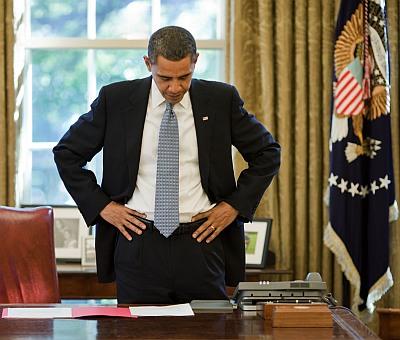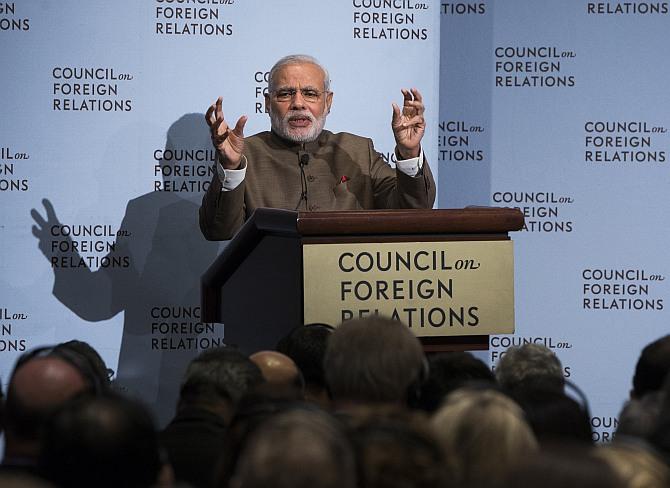 Hours ahead of his dinner with President Barack Obama, Prime Minister Narendra Modi cautioned the United States against hasty withdrawal of its troops from Afghanistan, citing the mistakes it has committed while pulling out from Iraq.
Hours ahead of his dinner with President Barack Obama, Prime Minister Narendra Modi cautioned the United States against hasty withdrawal of its troops from Afghanistan, citing the mistakes it has committed while pulling out from Iraq.
Modi told the Council on Foreign Relations here that India and the US together had played a big role in Afghanistan in recent years.
India, he said, had told the US that the process of withdrawal of its troops from Afghanistan should be slow to stop the rise of Taliban.
"We want Afghanistan which recently held the Presidential elections and formed a new government to grow democratically," he said.
"The process of withdrawal of troops from Afghanistan should be very slow. Afghanistan should be allowed to stand on its feet and then only can it stop the rise of the Taliban," Modi said.
On Terrorism
Rejecting any distinction between good and bad terrorism, Prime Minister Narendra Modi today called for a collective fight to effectively tackle the global menace.
"There is no good terrorism or bad terrorism. Terrorism has no boundary or country," Modi said.
"There is a need to take the challenge of terrorism seriously. It's sad that many countries could not earlier understand the ugly face of terrorism which is enemy of humanity," he said.
Asked if he was comfortable with President's Obama's description of ties with India as a "partnership", Modi said, "one does not have to be comfortable in everything and even between a husband and wife 100 per cent comfort is not possible. But despite that there is long-term binding."
On border issues with China
Modi ruled out any arbitration or adjudication on the boundary issue between India and China.
The prime minister told a questioner that India would not accept such arbitration because the countries were talking directly and were capable of resolving the issues through dialogue.
On ISIS threat to India
Asked about the rise of Islamic State (IS) militants in West Asia and whether there was any danger that such unrest might spread to India, the Prime Minister ruled that out and said that all terrorism activities in our country are exported and are not home-grown."
The Prime Minister said he was asked by the CNN about the Al Qaeda threat in India to which he responded that "Muslims of India will fail Al Qaeda."
The Prime Minister, who dwelt at length on the threat posed by terrorism, said it cannot be measured on the scale of political plus and minus.
"The world will have to speak in one voice against terrorism," he stressed.
On relations with neighbours
In his address,
As part of this exercise he also visited Nepal and Bhutan.
Referring to the Jammu and Kashmir floods which had left behind a trail of death and devastation, he said there was tremendous loss also in Pakistan-occupied Kashmir and he had expressed India's readiness to extend help to those affected across the border.

Wooing American investments
The prime minister used the occasion to reach out to American investors by promising an era of political stability in India alongwith easy and effective governance.
He said a number of steps have already been taken to simplify procedures and his government has initiated labour reforms and unveiled schemes for skill development.
On India's stand on the WTO pact, the Prime Minister asserted that agreement on food security and trade facilitation will have to go hand-in-hand.
In his address, Modi slammed previous regimes before his government for carrying out "appeasement and vote-bank politics" and pitched for development and good governance. He said he wants to create opportunities for a "neo-middle class" that has come above the poverty line.
He said that there are a large number of people, who have gone above the poverty line but are yet to find a place among the middle class.
"If we ignore our neo-middle class and they again slide back into poverty, then the poor will lose hope of coming out of poverty," he said as he unveiled his future plans for the country's development.
The mood of the new India
Giving credit to the youth for bringing out a "change" in the course of Indian politics, Modi said there is a new wave of aspiration in the country after the change of government as youth had earlier only seen disappointment.
"Earlier there was a habit in our country to keep small groups happy. Divide in small groups and keep your vote-bank intact. This has changed now.
"The thinking of the young generation of India has changed. The young generation of the country does not want to live in parts. The change has come due to the youth," Modi said.
Recalling that his party had fought the Lok Sabha elections on the plank of development and good governance which are difficult to pursue in the existing political discourse dominated by vote-bank politics, he said that they are the only answer to resolving all of India's problems.
Modi said that his government plans to focus on achieving a balance between agriculture, manufacturing and services to achieve growth.










